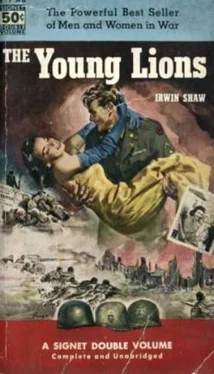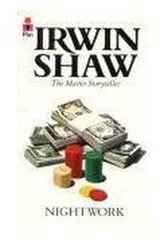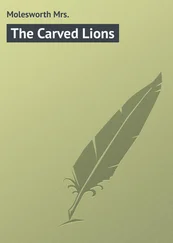Irwin Shaw - The Young Lions
Здесь есть возможность читать онлайн «Irwin Shaw - The Young Lions» весь текст электронной книги совершенно бесплатно (целиком полную версию без сокращений). В некоторых случаях можно слушать аудио, скачать через торрент в формате fb2 и присутствует краткое содержание. Жанр: Классическая проза, на английском языке. Описание произведения, (предисловие) а так же отзывы посетителей доступны на портале библиотеки ЛибКат.
- Название:The Young Lions
- Автор:
- Жанр:
- Год:неизвестен
- ISBN:нет данных
- Рейтинг книги:4 / 5. Голосов: 1
-
Избранное:Добавить в избранное
- Отзывы:
-
Ваша оценка:
- 80
- 1
- 2
- 3
- 4
- 5
The Young Lions: краткое содержание, описание и аннотация
Предлагаем к чтению аннотацию, описание, краткое содержание или предисловие (зависит от того, что написал сам автор книги «The Young Lions»). Если вы не нашли необходимую информацию о книге — напишите в комментариях, мы постараемся отыскать её.
The Young Lions — читать онлайн бесплатно полную книгу (весь текст) целиком
Ниже представлен текст книги, разбитый по страницам. Система сохранения места последней прочитанной страницы, позволяет с удобством читать онлайн бесплатно книгу «The Young Lions», без необходимости каждый раз заново искать на чём Вы остановились. Поставьте закладку, и сможете в любой момент перейти на страницу, на которой закончили чтение.
Интервал:
Закладка:
He turned to talk to Brandt, sitting in the back seat. Brandt was a photographer in one of the propaganda companies and he had hitched on to Christian's reconnaissance squadron as far back as Metz. He was a frail, scholarly-looking man who had been a mediocre painter before the war. Christian had grown friendly with him when Brandt had come to Austria for the spring skiing. Brandt's face was burned a bright red and his eyes were sandy from the wind, and his helmet made him look like a small boy playing soldiers in the family backyard. Christian grinned at him, jammed in there with an enormous corporal from Silesia, who spread himself happily over Brandt's legs and photographic equipment in the cramped, little seat.
"What're you laughing about, Sergeant?" Brandt asked.
"The colour of your nose," Christian said.
Brandt touched the burned, flaked skin gingerly. "Down to the seventh layer," he said. "It is an indoor-model nose. Come on, Sergeant, hurry up and take me to Paris. I need a drink."
"Patience," Christian said. "Just a little patience. Don't you know there's a war on?"
The Silesian corporal laughed uproariously. He was a high-spirited young man, simple and stupid, and apart from being anxious to please his superiors, he was having a wonderful time on his journey across France. The night before, very solemnly, he had told Christian, as they lay side by side on their blankets along the road, that he hoped the war didn't end too soon. He wanted to kill at least one Frenchman. His father had lost a leg at Verdun in 1916, and the corporal, whose name was Kraus, remembered saying, at the age of seven, standing rigidly in front of his one-legged father after church on Christmas Eve, "I will die happy after I have killed a Frenchman." That had been fifteen years ago. But he still peered hopefully at each new town for signs of Frenchmen who might oblige him. He had been thoroughly disgusted back at Chanly, when a French lieutenant had appeared in front of a cafe, carrying a white flag, and had surrendered sixteen likely candidates to them without firing a shot.
Christian glanced back, past Brandt's comic, burning face, at the other two cars speeding smoothly along on the even, straight road at intervals of seventy-five metres behind them. Christian's Lieutenant had gone down another parallel road with the rest of the section, leaving these three cars under Christian's command. They were to keep moving towards Paris, which they had been assured would not be defended. Christian grinned as he felt himself swelling a little with pride at this first independent command, three cars and eleven men, with armament of ten rifles and tommy-guns and one heavy machine-gun.
He turned in his seat and watched the road ahead of him. What a pretty country, he thought. How industriously it has been cared for, the neat fields bordered by poplars, the regular lines of the ploughing now showing the budding green of June.
How surprising and perfect it all had been, he thought drowsily. After the long winter of waiting, the sudden superb bursting out across Europe, the marvellous, irresistible tide of energy, organized and detailed down to the last salt tablet and tube of Salvarsan (each man had had three issued with his emergency field rations in Aachen, before they started out, and Christian had grinned at the Medical Department's estimate of the quality of French resistance). And how exactly everything had worked. The dumps and maps and water just where they had been told they would be, the strength of the enemy and the extent of his resistance exactly as predicted, the roads in precisely the condition they had been told they would be. Only Germans, he thought, remembering the complex flood of men and machines pouring across France, only Germans could have managed it.
Really, Christian thought playfully, at a time like this I should be humming Wagner. It is probably a kind of treachery to the Greater Third Reich not to be singing Siegfried today. He didn't like Wagner very much, but he promised himself he would think of some Wagner after he got through with the clarinet quintet. Anyway, it would help keep him awake. His head fell on to his chest and he slept, breathing softly and smiling a little. The driver looked over at him, and grinned and jerked his thumb at Christian in friendly mockery for the benefit of the photographer and the Silesian corporal in the back. The Silesian corporal roared with laughter, as though Christian had done something irresistibly clever and amusing for his benefit.
The three cars sped along the road through the calm, shining countryside, deserted, except for occasional cattle and chickens and ducks, as though all the inhabitants had taken a holiday and gone to a fair in the next town.
The first shot seemed to be part of the music.
The next five shots wakened him, though, and the sound of the brakes, and the tumbling sensation of the car skidding sideways to a halt in the ditch next to the road. Still almost asleep, Christian jumped out and lay behind the car. The others lay panting in the dust beside him, He waited for something to happen, somebody to tell him what to do. Then he realized that the others were looking anxiously at him. In command, he thought, the non-commissioned officer will take immediate stock of the situation and make his dispositions with simple, clear orders. He will betray no uncertainty and will at all times behave with confidence and aggressiveness.
"Anybody hurt?" he whispered.
"No," said Kraus. He had his finger on the trigger of his rifle and was peering excitedly around the front tyre of the car.
"Christ," Brandt was saying nervously. "Jesus Christ." He was fumbling erratically with the safety-catch on his pistol, as though he had never handled the weapon before.
"Leave it alone," Christian said sharply, "leave the safety-catch on. You'll kill somebody this way."
"Let's get out of here," Brandt said. His helmet had tumbled off and his hair was dusty. "We'll all get killed."
"Shut up," Christian said.
There was a rattle of shots. Slugs tore through the scout car and a tyre exploded.
"Christ," Brandt mumbled. "Christ."
Christian edged towards the rear of the car, climbing over the driver as he did so. This driver, Christian thought automatically, as he rolled over him, hasn't bathed since the invasion of Poland.
"For God's sake," he said irritably, "why don't you take a bath?"
"Excuse me, Sergeant," the driver said humbly.
Protected by the rear wheel of the car, Christian raised his head. A little clump of daisies waved gently in front of him, magnified to a forest of prehistoric growths by their closeness. The road, shimmering a little in the heat, stretched away in front of him.
Twenty feet away a small bird landed and strutted, busy with its affairs, rustling its feathers, calling unmusically from time to time, like an impatient customer in a deserted shop. A hundred yards away was the road-block.
Christian examined it carefully. It was squarely across the road in a place where the land on both sides rose quite steeply, and it was placed like a dam in a brook. There were no signs of life from behind it. It was in deep shadow, shaded by the rustling trees that grew on both sides of the road and made an arch over the barricade. Christian looked behind him. There was a bend in the road there, and the other two cars were nowhere to be seen. Christian was sure they had stopped when they heard the shots. He wondered what they were doing now and cursed himself for having fallen asleep and letting himself get into something like this.
The barricade was obviously hastily improvised, two trees with the foliage still on them, filled in with springs and mattresses and an overturned farm cart and some stones from the near-by fence. It was well placed in one way. The overhanging trees hid it from aerial observation; the only way you'd find out about it would be by coming on it as they had done. It was a lucky thing the Frenchmen had fired so soon. Christian's mouth felt dusty. He was terribly thirsty. The cherries he had eaten suddenly made his tongue smart where it had been burned a little raw by cigarettes.
Читать дальшеИнтервал:
Закладка:
Похожие книги на «The Young Lions»
Представляем Вашему вниманию похожие книги на «The Young Lions» списком для выбора. Мы отобрали схожую по названию и смыслу литературу в надежде предоставить читателям больше вариантов отыскать новые, интересные, ещё непрочитанные произведения.
Обсуждение, отзывы о книге «The Young Lions» и просто собственные мнения читателей. Оставьте ваши комментарии, напишите, что Вы думаете о произведении, его смысле или главных героях. Укажите что конкретно понравилось, а что нет, и почему Вы так считаете.











